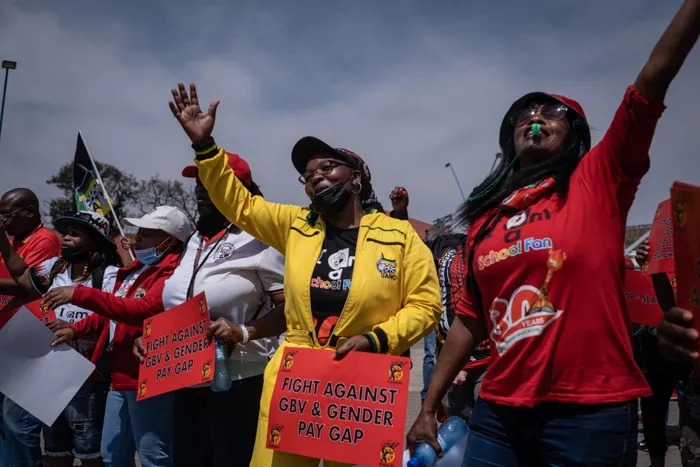Women's Day: 'Silence Is No Longer An Option'

Members of the Congress of South African Trade Unions (COSATU) and the African National Congress (ANC) protest against gender based violence, high unemployment and the gender pay gap at a rally held in the Mary Fitzgerald Square, Johannesburg on October 7, 2021.
Image: AFP
Tswelopele Makoe
Every August, the streets of South Africa hum with the remembrance of that powerful day in 1956, when more than 20,000 women of all races stood side by side in Pretoria, marching against the tyrannical pass laws of the apartheid regime. "Wathint’ Abafazi, Wathint’ Imbokodo!" they cried - "You strike a woman, you strike a rock!"
The women’s march was so much more than a revolutionary protest against systemic oppression; it was also a resounding declaration that women are not passive observers of change; they are the very heartbeat of resistance and revolution. Our beloved mother of the nation, Winnie Madikizela-Mandela, used to eloquently say: “We have a shared destiny, a shared responsibility to save the world from those who attempt to destroy it.”
But almost 70 years later, I ask myself: If the women of 1956 were rocks, unshakable and resolute, then why are so many of our sisters, grandmothers, and daughters still being crushed beneath the weight of a society that continues to marginalise them?
Racism, misogyny, sexism, and more, in South Africa, are not some relic of the past. It is structural, cultural, and often violently enforced. According to a recent report by the South African Police Services (SAPS) on crime statistics, a total of 13,453 sexual offences were recorded between January and March 2025. This includes 10,688 rape cases, 1,872 sexual assaults, 656 attempted sexual offences and 236 contact sexual offences. These statistics are horrifying, and paint a painfully dreadful picture of our post-apartheid society - one that scores of brave and brilliant women sacrificed their lives for.
Violence against women is a stark reality and is shockingly more normalised than ever before. We see it in the headlines, yes, but more painfully in the ubiquitous silence: the stories not told, the cases not reported or where reported often not pursued, the survivors not believed, etc.
August has become a month of praise and parades, filled with glossy campaigns, hashtags, and performative affirmations. But beneath the veneer, the daily reality of being a woman in South Africa is still marked by fear, injustice, and invisibility.
We celebrate the historic women who marched — Lillian Ngoyi, Albertina Sisulu, Helen Joseph, Fatima Meer, Rahima Moosa, and so many more — but far too often, we fail to see and uplift the women marching today. The domestic worker who wakes before dawn and returns in the harrowing cold of the dark, for a mere pittance. The graduate was consistently overlooked for promotion in boardrooms still predominantly run by men. The young girl is navigating a school system where her worth is still too often linked to her body and not her mind. These are the realities of numerous women in SA and across the globe today.
We simply cannot romanticise about the struggle of the women of 1956 without essentially acknowledging the continuation of that struggle in the bodies, lives, and dreams of women today.
Our society has a clever way of applauding women while simultaneously sidelining them. This happens in workplaces, governance, even religious and educational institutions. Women are often given a token position, merely symbolic and not truly reflective of equal power, influence, or decision-making authority - but rather, just used to tick a gender and diversity box.
Furthermore, the language of celebration is often used to mask the reality of continued exploitation, silencing, and subjugation. Women are still being told what to say, what to wear, when to lead, and when to stay silent. This contradiction reveals how empowerment rhetoric can coexist with — and even obscure — deeply ingrained systems of control.
Despite it all, women rise - leading households, communities, movements, and far beyond, with strength and innate purpose. Women are artists, teachers, scientists, healers, entrepreneurs, and activists, carrying the emotional weight of a nation while still finding ways to organise, resist, and rebuild. What’s explicitly clear, however, is that the capacity of a woman to endure should never justify the continuation of systems that oppress them.
This is a particularly pertinent message for black women, who live at the intersection of race, gender and class, and know first-hand how power and oppression collide in ways that define our daily realities. For what’s not often emphasised is this very fact: black womanhood is not a trend, it’s a legacy.
This Women’s Day, truly honouring the women of 1956 lies not in remembrance alone; it demands that we show up, speak up, and stand up. “We should be teaching young girls to take up space,” our astounding, proudly Xhosa Miss Universe Zozi Tunzi once declared. We cannot keep clapping for the past while ignoring the present. If we truly want to pay tribute to the stalwarts of 1956, we must rise in defence of those still unheard today. Don’t just repost quotes. Don’t just wear a pin. Demand better. Do better. Be louder. Because the struggle isn’t over, and silence is no longer an option. As the formidable Mama Winnie once boldly said: “Any acceptance of humiliation, indignity, or insult is an acceptance of inferiority.”
* Tswelopele Makoe is a Gender & Social Justice Activist and the Editor at Global South Media Network (GSMN). The views expressed are her own.
** The views expressed do not necessarily reflect the views of IOL, Independent Media or The African.